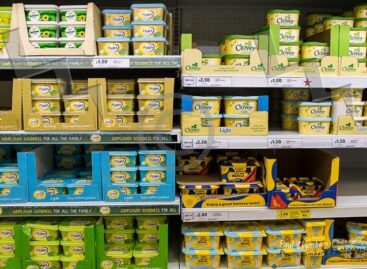Magazine: Is there a straight road leading to the circular economy?
The Federation of Hungarian Food Industries (ÉFOSZ) celebrated its 30th anniversary by changing its name to Federation of Responsible Food Manufacturers (FÉSZ). They did this to symbolically reinforce the fact the shared value of members had become operating responsibly.

Réka Szöllősi
managing director
FÉSZ
According to Réka Szöllősi, managing director of FÉSZ, the task of food companies is to make consumers think in realistic terms, and to teach them about how to form the preferences with which they can contribute to reducing the burden they put on the environment by what and how they eat and drink. The federation’s objective with the Hello Food programme is to build trust in the food sector by using ‘personal’ messages, showing the actual people behind the processes. Ms Szöllősi reckons that putting the Hungarian food industry on a sustainable path requires realistic, well-defined, consensus-based goals, stable and supportive backing from decision-makers, economic motivating factors and eco-modulation tools; and on the corporate side international best practices, regularly updated knowledge – plus the dedication of consumers.
In 1992 the Hungarian Association of Environmental Enterprises (KSZGYSZ) was established to assist in the implementation of environmental protection measures and their legal background. Today the organisation has 240 member companies and it can recommend experts or technologies for practically all kinds of environmental matters.

Gergely Hankó
managing director
KSZGYSZ
KSZGYSZ managing director Gergely Hankó revealed to us that the EU’s circular economy legislation package had given new momentum to sustainability efforts, and the association is happy to see how certain FMCG companies are making sustainability pledges. As for the consumers, Mr Hankó thinks that in spite of the positive changes, consumers often paint a more positive picture of themselves and their efforts in the domain of environmental protection than the actual situation is. The managing director believes that companies must be made interested in switching to the circular economy: as long as primary resources and raw materials are cheaper then renewable and recycled ones, things won’t change much.

Dr. Ágnes Fábián
vice president
Magyar Márkaszövetség
By now leading brands have moved on from the concept of ‘classic product in good quality, offered at a competitive price’, and they are championing progressive causes such as sustainability. Dr Ágnes Fábián, vice president of Branded Goods Association (BGA) Hungary and managing director of Henkel Magyarország Kft. told our magazine that this step requires fast and radical changes, which aren’t always easy, e.g. a company might want to switch to biodegradable plastic packaging, but it can happen that there isn’t enough raw material available in the market.
The majority of BGA Hungary members have made several global pledges as regards the full life cycle of the products they make, from eco-design to less packaging waste recycled more efficiently. Ms Fábián’s experience is that shoppers have become more conscious, more and more of them looking for sustainable products in shops. Several BGA Hungary members are implementing campaigns to educate consumers about responsible consumption – sometimes in kindergartens and schools. Good laws, good corporate practices and good consumption habits are all needed to make changes. The vice president believes that good examples shown by strong brands can make an impact on others. BGA Hungary maintains a permanent conversation with the government, giving opinions on draft legislation and recommending regulations. //
Related news
They want it to be premium, but also sustainable – expectations of the youngest generation
GlobalData’s latest report, “Demographics in Retail and Apparel” – which…
Read more >Prices rose by 3.7% in November
Following a 3.2% year-on-year increase in October, consumer prices in…
Read more >Lab-grown meat: the future of sustainable food production or a dead end?
In recent years, increasing attention has been paid to laboratory-grown…
Read more >Related news
Co-op uses AI to fight GBP 40m losses in the UK
British supermarket chain Co-op is using AI technology to detect…
Read more >Plant-based brands risk losing consumer interest, says Flora exec
Flora Food Group marketing director Ian Hepburn has warned that…
Read more >Albertsons Terminates Merger With Kroger
Albertsons has terminated its $25-billion (€23.7 billion) merger agreement with Kroger after…
Read more >








